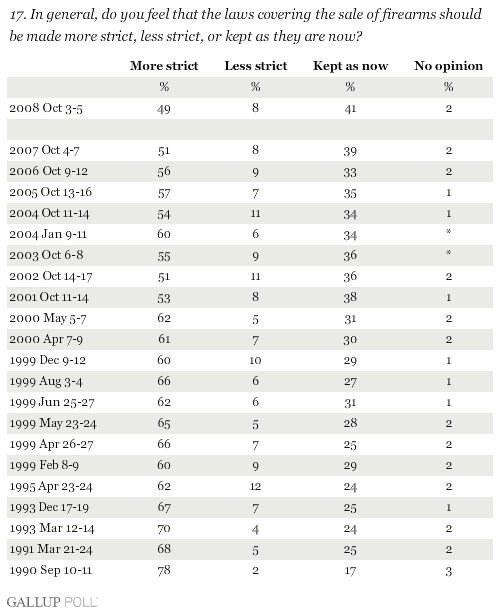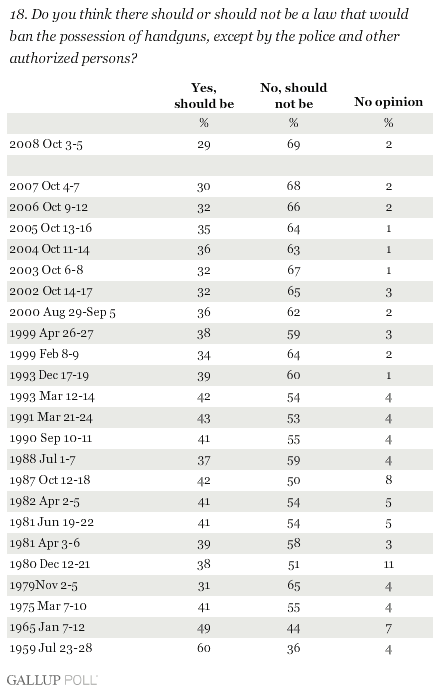PRINCETON, NJ -- In Gallup polling conducted prior to last week's gun massacre at an immigrant center in Binghamton, N.Y., only 29% of Americans said the possession of handguns by private citizens should be banned in the United States. While similar to the 30% recorded in 2007, the latest reading is the smallest percentage favoring a handgun ban since Gallup first polled on this nearly 50 years ago.
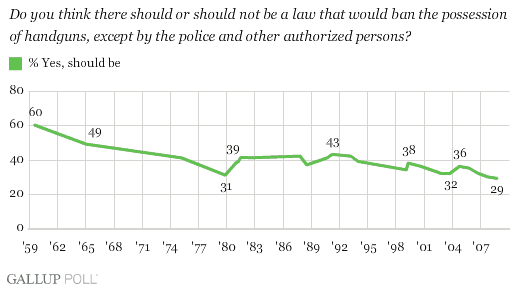
Public support for restricting the sale and possession of handguns to "police and other authorized persons" was relatively high in the early 1990s, with 41% to 43% in favor, but has since edged lower. At the same time, opposition to a ban has increased from 53% in 1991 to 69% in the most recent survey.
The latest figures come from the most recent installment of Gallup's annual Crime survey, conducted Oct. 3-5, 2008. It is unclear what impact, if any, the recent Binghamton incident may have on Americans' views of gun control.
Separately, the October Crime survey found just under half of Americans, 49%, wanting the laws covering the sale of firearms to be made stricter than they are now. This is the lowest percentage favoring stricter gun laws in Gallup trends since the question was first asked in 1990. While only 8% say gun laws should be made less strict, 41% say they should remain as they are now.
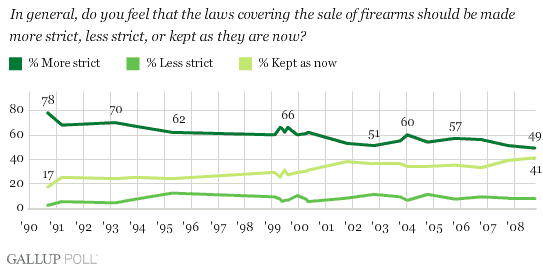
Thus, as of last fall, Americans were evenly divided at 49% each over whether the laws covering the sale of firearms should be made stricter, or not. This contrasts with public opinion in the early 1990s, when the balance of opinion was more than 2 to 1 in favor of making gun laws more strict.
While Gallup finds broader support among Americans for stricter gun laws than for banning handguns, the demographic patterns in support for each policy are similar. Women are more in favor of each proposal than are men; Democrats are much more supportive than independents and Republicans; and gun non-owners are much more supportive than the 43% of Americans who have a gun in their household or on their property. There are only minor differences in views among residents of the four major regions of the country, as well as by age.
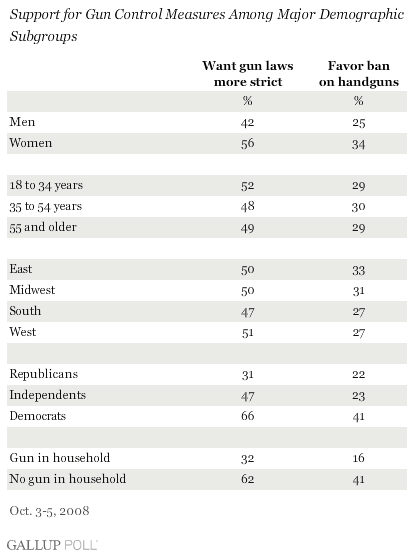
Discussion
Since last October, several shooting sprees around the country have made headline news, including a Christmas Eve incident in California where a man dressed as Santa Claus killed nine guests at a house party. In March, a gunman killed 10 innocents at an Alabama home, including several members of his family, a guest of the family, and her 18-month-old daughter. And on April 3, an immigrant from Vietnam living near Binghamton, N.Y., went on a shooting spree at a citizenship center there, taking the lives of 13 workers and fellow immigrants.
The impact of this string of horrific shootings could have altered Americans' views on gun laws since Gallup last measured them. Gallup polling in 1999 suggests that the Columbine High School shootings in April of that year resulted in a slight increase in support for stricter gun laws, lasting for at least two months. However, this past October's record-low support for gun control was obtained after several high-profile gun crimes were carried out in 2007 and 2008, including the Virginia Tech shootings in April 2007, billed as "the deadliest mass shooting in modern U.S. history." That incident resulted in the deaths of 32 people aside from the shooter.
In fact, reduced support for gun-control measures in recent years corresponds with a decline in the national murder rate over the same period. According to FBI statistics, the murder rate dropped sharply in the late 1990s -- falling from 8.2 victims per 100,000 inhabitants in 1995 to 5.7 by 1999 -- and has since remained between 5.5 and 5.7.
The higher public support for banning guns and strengthening gun laws seen from about 1988 through 1993 -- the year the Brady Bill (which provided for a waiting period and a national criminal background check before a handgun purchase) was passed in Congress -- corresponds with the relatively high U.S. murder rate recorded during those years. According to the FBI, there were more than 8 murders per 100,000 inhabitants in the United States in each year from 1988 through 1994, peaking at 9.8 murders in 1991.
The FBI has yet to release its report on crime in 2008, but assuming the lower murder rates seen in recent years continue, Americans will be faced with the conflicting factors of a relatively low overall murder rate, but a spate of recent mass shooting incidents. How the public will interpret this in terms of the need for stricter gun laws remains to be seen.
Survey Methods
Results are based on telephone interviews with 1,011 national adults, aged 18 and older, conducted Oct. 3-5, 2008. For results based on the total sample of national adults, one can say with 95% confidence that the maximum margin of sampling error is ±3 percentage points.
Interviews are conducted with respondents on land-line telephones (for respondents with a land-line telephone) and cellular phones (for respondents who are cell-phone only).
In addition to sampling error, question wording and practical difficulties in conducting surveys can introduce error or bias into the findings of public opinion polls.
